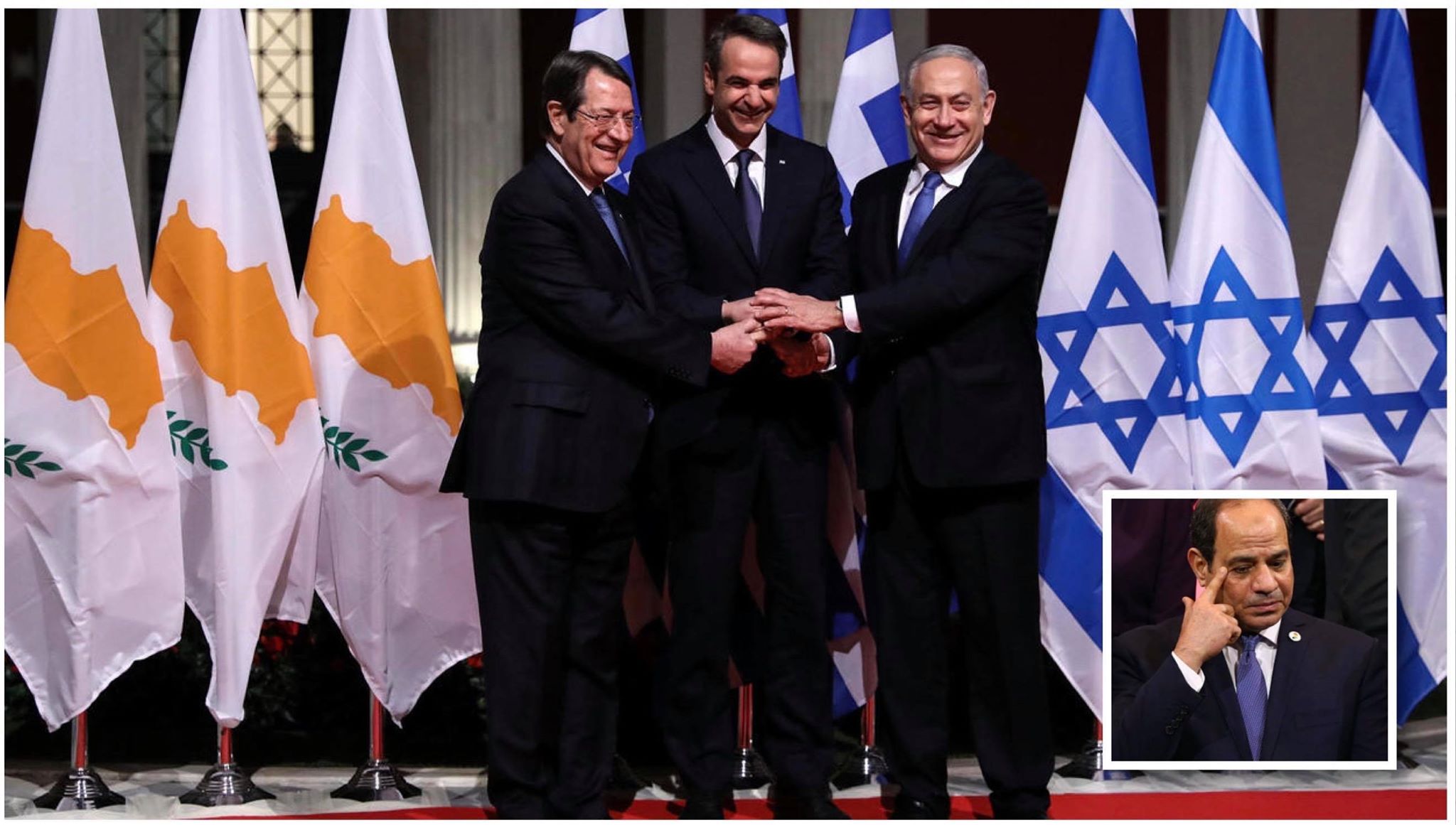In absentia of General Abdel-Fattah al-Sisi’s regime, his three close allies in the field of gas signed the
East Mediterranean pipeline agreement, which threatened the Egyptian dream to become a regional hub
for the trade and distribution of liquefied natural gas to Europe.
The EastMed pipeline agreement signed by Cyprus, Greece and Israel on January 3 in Athens to supply
Europe with natural gas has raised Egyptian fears about its potential impact on Egypt.
The project comes at a time the al-Sisi regime is seeking to become a regional hub for the trade and
distribution of liquified natural gas to Europe.
Turkey is working to extend its control over energy resources in the Mediterranean through the drilling
for gas off the coast of the Turkish Republic of Northern Cyprus.
The EastMed pipeline is supposed to extend over 1,872 kilometres (1,163 miles) and promises to
transport 9-11 billion cubic metres of gas annually from the marine reserves of the Eastern
Mediterranean Basin off Cyprus and Israel to Greece, as well as to Italy and other countries in
southeastern Europe.
Actually, it could be said that the EastMed pipeline is planned to extend from Israel to Cyprus across the
Egyptian maritime borders, which the al-Sisi regime has ceded to Israel, Cyprus, and Greece in the
maritime border demarcation agreement between the three countries.
Israel did not have direct maritime borders with Cyprus or Greece until the last border demarcation
agreement was signed.
According to the Turkish-Libyan version of the demarcation of the maritime border, these sea areas are
owned by Egypt, which means that Cairo, or Ankara, is supposed to be in control of gas exports from
Israel to Europe because Israel has no direct maritime border with a European country.
The al-Sisi regime gave Israel the direct maritime border with Europe, and now he has been stabbed in
the back by his gas allies.
Egypt is strategically located and has energy infrastructure with two gas liquefaction stations in Idku and
Damietta, from which it exports gas shipments to global markets.
The al-Sisi regime signed an agreement with Israel to import and liquefy gas in Egypt and export it to
Europe, but now Israel can sell gas directly to Europe without the Egyptian mediator.
A series of gas fields have been discovered in the area during the past few years to supplement gas
imported from the fields of Cyprus and Israel.
The largest one is the Zohr field discovered in the Mediterranean in August 2015. The field’s reserves
were estimated at 30 trillion cubic feet and its production stood at 2.7 billion cubic feet per day at the
end of 2019. It put Egypt back on the export market.
Officials in Egypt say that the EastMed gas pipeline will not have any impact on Egypt as a focal point for
energy trade and exchange in the region.
They said Europe consumes 200 billion cubic metres of gas annually; a third of this quantity is secured
from Russia and the rest from other countries.
Egyptian officials point out that Israel, Cyprus, and Greece will not produce a huge quantity of gas at up
to 50 billion cubic metres.
Observers say that this is true in theory. Israel, Cyprus and Greece will not provide quantities of gas that
would make Europe dispense with Egyptian gas, but in return, the new gas pipeline means that these
countries are exporting to Europe without the need for Egypt.
This means that Europe will not dispense with Egyptian gas, but Egypt has lost control of other suppliers
to Europe.
It is not unlikely that an agreement will be reached during the next meeting of the Eastern
Mediterranean Gas Forum to extend another line from Egypt connected to the EastMed line.
On July 25, 2019, Egypt created the East Mediterranean Gas Forum with the participation of seven
countries: Egypt, Jordan, Cyprus, Greece, Italy, Israel, and Palestine. The forum aims to create a
regional gas market that serves the interests of its members by managing supply and demand.
Gas reserves in the region are estimated at 122 trillion cubic feet. Now Egypt finds itself excluded from a
new small alliance, which includes his close allies.
The EastMed pipeline agreement sends a clear message to Egypt that there is an alternative for it to
supply gas to Europe, which sets future conditions on the passage of gas through its territories.
Egyptian officials hope the EastMed line will never be implemented due to its planned length, its
passage in deep waters and its enormous cost of $7 billion. They claim that this pipeline has been under
consideration since 2015.
Experts say that even if it will not be implemented, its message has been delivered to the al-Sisi regime,
clearly and painfully.





Recent Comments